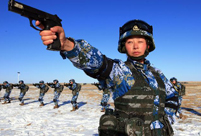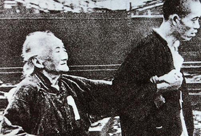 Chinese artists from Flight MH370 and their art
Chinese artists from Flight MH370 and their art
 Top 30 entrepreneurs under 30 in China
Top 30 entrepreneurs under 30 in China
 800-year-old ancient village in Shanxi
800-year-old ancient village in Shanxi
 World's top 10 most prestigious institutions
World's top 10 most prestigious institutions
 Chinese airborne troops conduct low altitude flight training
Chinese airborne troops conduct low altitude flight training
 Beautiful fisherwomen in SE China
Beautiful fisherwomen in SE China
 1,500-year-old coffin excavated from grassland in N China
1,500-year-old coffin excavated from grassland in N China
 See what Google glass captures at 'two sessions'
See what Google glass captures at 'two sessions'
 In pictures: beautiful women in different ages
In pictures: beautiful women in different ages
The contraction of China's exports in February coincided with a rapid depreciation of the yuan, making the contraction even harder to explain and the outlook of China's exports this year even more unpredictable.
A reduction in a country's currency cuts the cost of goods it sends abroad.
The recent depreciation of the Chinese yuan, which has dropped 1.2 percent against the US dollar to 6.1247 since Feb 18, mainly reflects the Chinese central bank's intention to create two-way currency movements.
It took opportunity of a period of slowing growth, reduced inflows and emerging depreciation expectations to create two-way currency movements, said Jian Chang, chief China economist at Barclays.
Exports contracted by 18.1 percent year-on-year in February after stronger-than-expected 10.6 percent growth in January.
"Large volatilities in Chinese export growth have not been uncommon, especially during the Lunar New Year period. However, the February print was much lower than our forecast of a growth of 1 percent and consensus of 7.5 percent," said Chang.
Regarding the outlook for China's exports this year, Chang said Barclays remains cautious, with a conservative export growth forecast of 9.3 percent year-on-year.
Zhu Ye, manager of Alchemist, a trading company specializing in the export of chemical products based in Changshu, in East China's Jiangsu province, has seen the chemical export industry remain almost static in the past few years with hardly any sign of improvement shown so far. The depreciation of the yuan helps a little with his business, especially for orders settled on a monthly basis.
"It's almost like an unexpected fortune to see the money in the account receivables increase because of the depreciation of the yuan. But for the orders settled over a longer-term basis, there is no benefit. It is too early to understand the real impact," said Zhu.
he yuan appreciated rapidly in 2012, which meant some export-oriented companies suffered huge losses. Zhu's company was among those affected, though not to a large degree.
"Even though it was not a big amount of money for us, we still hope to see the yuan remain stable. Otherwise, company owners will be disconcerted and won't know what to do," he said.
Learning from the past few years, Zhu has come to realize that export-oriented companies should no longer rely on exchange rates. What the Chinese chemical industry needs most at present is a thorough restructuring instead of closing down smaller and less environmentally friendly companies and expanding the capacity of larger companies, which is currently taking place, he added.
Of course, there are companies that have looked further ahead and applied themselves accordingly.
For example, although exports of Chinese textile products remain on the whole gloomy this year, Gu Zhongwei, general manager of Wuxi-based Handa Enterprise Fabric Department, said his company is doing quite well so far this year, largely because of a restructuring that started two years ago.
"The yuan has been appreciating in the past few years - and extremely rapidly last year. This is really bad news for export-oriented companies, which are labor-intensive and are heavily dependent on exchange rates. So, two years ago, we started an inner restructuring to digest ever-soaring costs such as labor and confront the volatile exchange rate," said Gu.
 Chaihe village, pure and peaceful fairyland in snow
Chaihe village, pure and peaceful fairyland in snow Belgians warmly welcome arrival of China's giant pandas
Belgians warmly welcome arrival of China's giant pandas Female marines receive tactical training in NW China
Female marines receive tactical training in NW China Blood memory: Nanjing Massacre in 1937
Blood memory: Nanjing Massacre in 1937 Top 10 pure beauties in showbiz
Top 10 pure beauties in showbiz British WWII veteran: I can't forgive Japan
British WWII veteran: I can't forgive Japan Tongban's dream of prosperity
Tongban's dream of prosperity Chinese frigate Yancheng holds drills in Mediterranean Sea
Chinese frigate Yancheng holds drills in Mediterranean Sea A visit to comfort woman's home in South Korea
A visit to comfort woman's home in South Korea Fairyland? Qingdao in sea of clouds
Fairyland? Qingdao in sea of clouds Top 10 most handsome faces in Asia in 2013
Top 10 most handsome faces in Asia in 2013 Female celebs with beautiful long legs
Female celebs with beautiful long legs Cat 'guardians' in Forbidden City
Cat 'guardians' in Forbidden City Large numbers of ancient coins excavated in Inner Mongolia
Large numbers of ancient coins excavated in Inner Mongolia Leisurely life beneath Zhonggulou, where time travels slower
Leisurely life beneath Zhonggulou, where time travels slowerDay|Week|Month